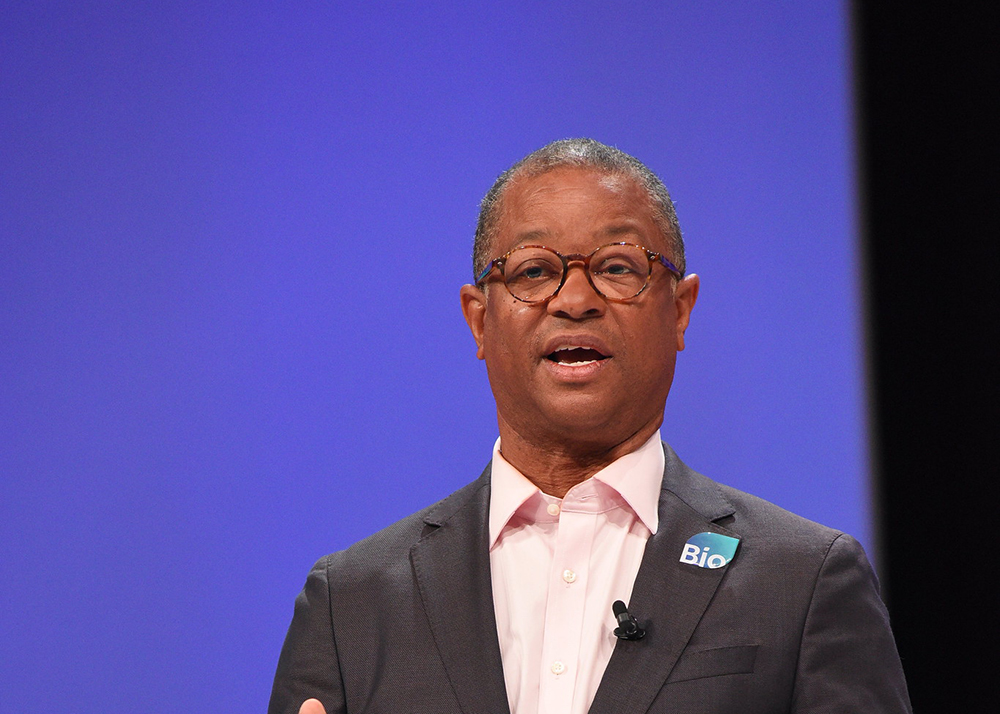Perhaps best known for his success in bringing breakthrough sickle cell treatments to patients, Dr. Ted W. Love has dedicated his life to helping people. He sat down with the Biotech 2050 Podcast to share his journey in biotech and what drives him, as well as insights into the challenges the industry faces.
Before becoming chair of the Board of Directors at the Biotechnology Innovation Organization (BIO) in 2023, Dr. Love was President and CEO of Global Blood Therapeutics (GBT), a company that pioneered sickle cell disease treatments.
“GBT was probably my proudest achievement because it really focused on a population of patients who had been dramatically ignored,” Dr. Love tells podcast host Rahul Chaturvedi, founder and CEO of Clora.
Dr. Love’s start in biopharma
Dr. Love shares how he started working for Genentech in 1992, where he got firsthand experience in drug development, such as Herceptin (targeted therapy used in cancer treatments), Rituxan (antibody therapy used in combination with chemotherapy), Xolair (asthma treatment), and Avastin (age-related macular degeneration [AMD] treatment).
“[Genentech] was big enough that I could learn everything that I needed to learn, but it was small enough that I could get a really intimate experience,” he recalls.
Dr. Love’s experience at Genentech, followed by his involvement with Novello and Onyx Pharmaceuticals, led him to GBT.
According to Dr. Love, the biopharma business is challenging, and a dedicated community and collective mindset truly make a difference.
“It took us all to do what GBT did in bringing a very innovative therapy to patients in a very short amount of time that’s now available to help patients around the world,” he notes.
Challenges and hardships in biotech
Dr. Love is on a mission to change how biotech and biopharma are perceived by the public.
“I think it’s unfortunate that many people don’t have the understanding of our industry, and they mischaracterize our industry,” he notes, adding that at its core, biotechnology’s purpose is to save the world.
Many of the challenges often come from the political and regulatory spheres, like the Federal Trade Commission (FTC) and the Inflation Reduction Act (IRA), which according to Dr. Love, can sometimes do more harm than good when it comes to innovation.
“Specifically, I think about the FTC and how the FTC is putting up barriers to us doing deals, doing mergers and acquisitions,” he says, explaining that acquisitions bring capital to smaller companies, allowing them to invest in more research and development.
Despite the extremely challenging environment, Dr. Love believes that discipline and focus can help create a great company, as can monitoring “the three Ps:” people, products, and pennies.
When hard work pays off
The discipline, focus, right people, and—arguably one of the most important pieces of the puzzle—patience, was the right formula at GBT. The company created Oxbryta, a sickle cell disease treatment that significantly ameliorates the symptoms of the disease.
The first generation of Oxbryta is a hemoglobin S polymerization inhibitor that improves the ability of the hemoglobin to hold on to oxygen and prevents it from forming chains. The second generation is currently in the works, Dr. Love says, and it is about 15 times as potent.
Oxbryta received accelerated approval from the FDA in 2019. In 2022, Pfizer acquired GBT for $5.4 billion.
Though awe-inspiring and potentially rewarding, Dr. Love describes being CEO as “a pretty lonely position.”
“There is a loneliness in the CEO position that people should be prepared for. There is an enormous burden of responsibility that you can feel in that position. I felt an enormous burden to deliver for the patients that we were committed to and look out for every employee that joined our initiative. I also felt an enormous burden from investors who had invested in the company and in me. Anyone taking on the job should be ready for loneliness, and I think there is a big burden that you need to accept,” he says.




